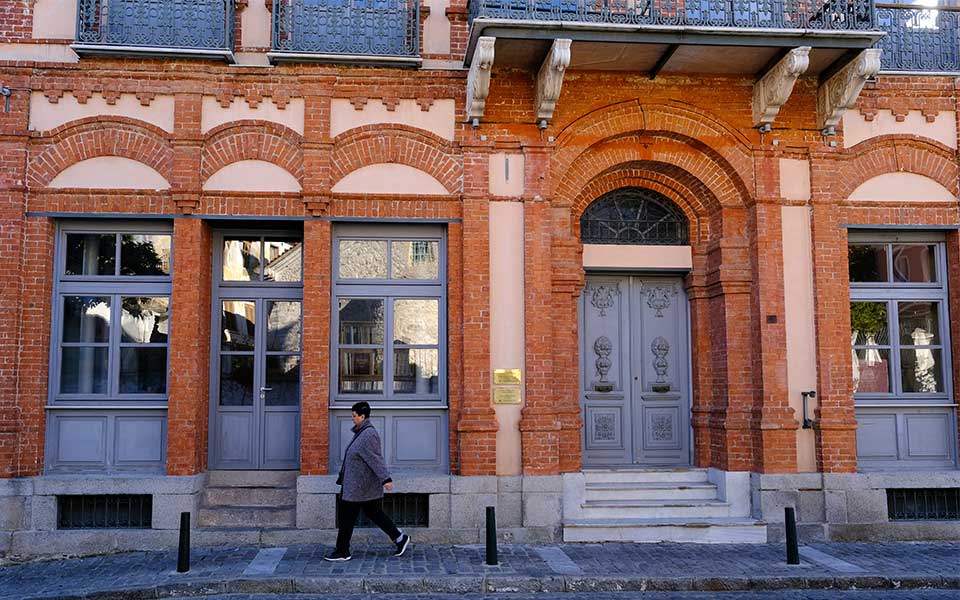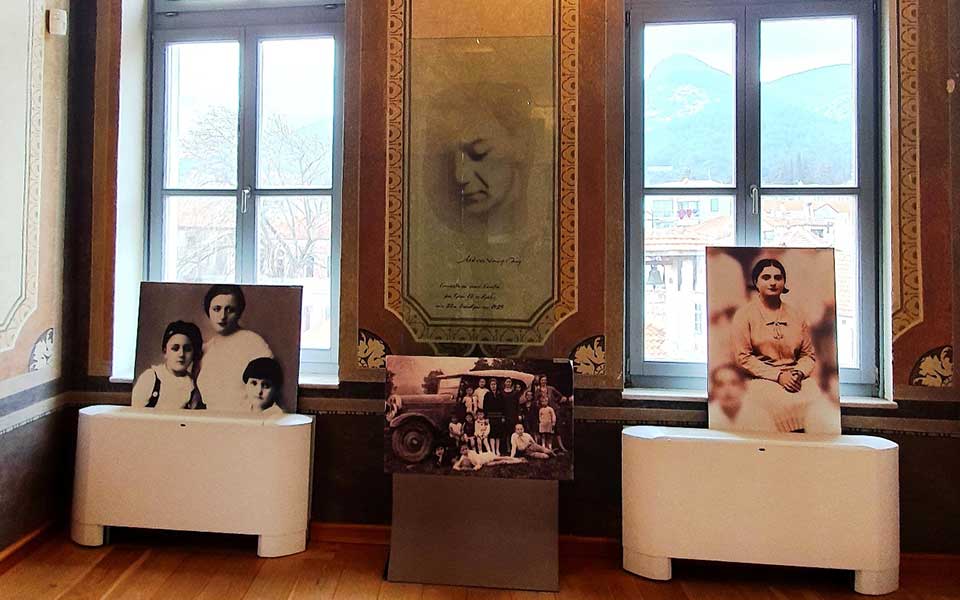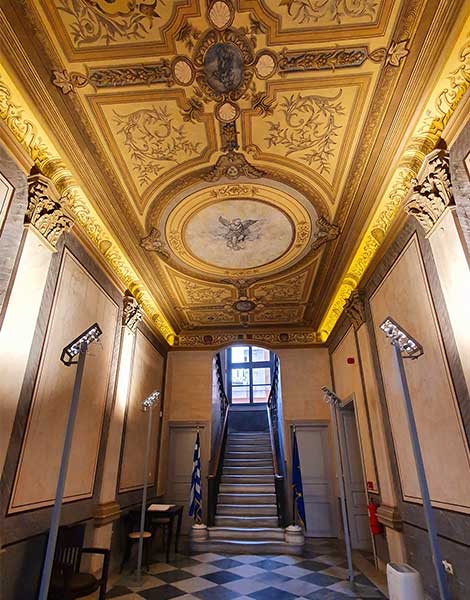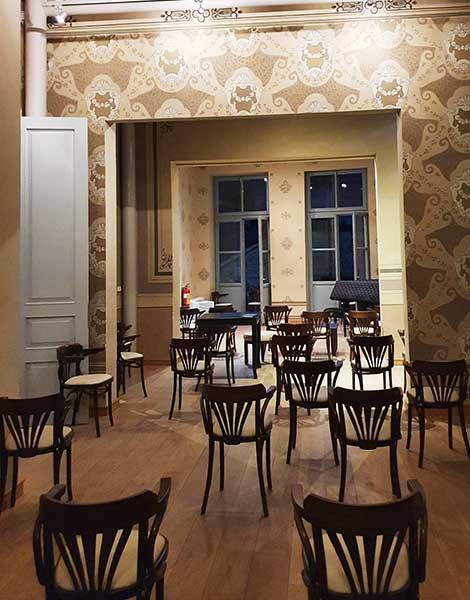Every Corner Tells a Story: The Old Town...
Without noise or concrete, the Old...

© Shutterstock
The man who went on to transform the Greek and international music scenes with his music, unique style, and thought-provoking words was born on a day like today, in 1925. Manos Hadjidakis was born on October 23, 1925. This day serves as a yearly reminder of the greatness of this Greek composer and the profound impact his work has had on the ideas and expressions of thousands of people worldwide.
Some say he was born in Xanthi, the city of a thousand colors, while according to others, he moved there as a young child due to his father’s work commitments. Ultimately, though, part of his fascinating life and diverse body of work is now intrinsically connected to the special place where he was raised and initially exposed to music, on the outskirts of the old town of Xanthi. We are referring to the Multiplex Space of Arts and Thought, as the residence of Manos Hatzidakis is now known. Visitors entering the building are immediately captivated by the impressive frescoes and ceiling paintings, mosaic floors and stained glass windows that adorn its interior. It is a priceless work of art as well as a jewel for the city of Xanthi.
In 2000, Giorgos Pavlidis, the late Governor of Xanthi and later Regional Governor, laid the groundwork for the restoration of the building in honor of the great 20th century. Today, twenty-three years later, local authorities and citizens take pride in the fact that the city will be able to host a variety of important events in a venue of such high architectural and cultural value, a true legacy to the city’s future residents and numerous visitors.

© ANA-MPA SA
Speaking to the Athens-Macedonian News Agency (AMNA), Mihalis Pouspourikas, President of the Multiplex’s Management Committee, highlighted the remarkable work completed over a number of years to completely renovate the structure and unveil its hidden beauties. The church of Aghios Vlassis, built in 1825, is located opposite the house of Manos Hadjidakis. Manos used to throw teaspoons out of his window seat when he was a boy, so the story goes. Some biographers claim that the sounds made by the spoons falling were his first musical experiences. “When Stavros Xarhakos visited the house,” Mr. Pouspourikas recalls, “he walked to the window, opened it, and looked at the church. He felt deeply moved when he realized the source of the distinctive tone in Manos’s music. He turned to us and said: ‘Now I see where Manos’ music gets these Byzantine elements from – the Sunday Service at Aghios Vlassis’.”

© ANA-MPA SA

© ANA-MPA SA
It only takes a visit to the building’s striking spaces to spark reflection, contemplation, exploration, and questions regarding issues about the cultural development of not only Xanthi, but also our country as a whole. It is a space in which citizens now come together to compose a “New Narrative” under the fertile and decisive influence of Manos Hadjidakis’ work.
The building was constructed in the late 18th century, around the same time as the Villa Allatini in Thessaloniki, explains Xanthi-born guide and museologist Natasha Mihailidou. “The building belonged to a prosperous Jewish man named Isaac Daniel. He was a banker who was also involved in tobacco trading and real estate. He purchased the building and had it built in two phases. It is perhaps the most characteristic example of Xanthi’s cosmopolitan outlook. It is no coincidence that the house was built in a privileged location on a hill with views of the entire city at that time. Unfortunately, today the view has been greatly restricted due to the construction of apartment buildings.”
The building passed into the hands of Isaac Daniel’s children after his death. Due to their inability to pay the inheritance tax, the Ministry of Finance took possession of the building and converted it into the city’s Tax Office. After the Civil War, it was given to the army and used as the city garrison headquarters.

© ANA-MPA SA
The great creator Manos Hadjidakis was born in Xanthi on October 23, 1925. His father, Georgios Hadjidakis, settled in the city to practice law. At the time, Xanthi was experiencing a significant boom because of the tobacco trade, and commercial partnerships with foreign tobacco firms created a fertile professional environment for Georgios Hadjidakis.
The Hadjidakis family rented the second floor of the now-listed “Grand Maison” building. Hadjidakis began his great journey into the magical world of music thanks to the grand piano in the house and the lessons he received from his Armenian music teacher, Anna Altounian. The only private school in Xanthi, where Manos received his first lessons, was also located on Eleftheriou Venizelou street. The Hadjidakis family moved to Athens permanently in 1932.
Today, on the second floor of the building, old photographs of Manos Hadjidakis and his family, his Armenian music teacher, as well as music scores of his works, handwritten notes, and a few personal items, testify to the time the great Greek composer spent in this house, which was undoubtedly marked by his presence.
Speaking to the Athens-Macedonian News Agency (AMNA), Michalis Pouspourikas emphasizes the enormous potential of this imposing building for the overall cultural and artistic regeneration of the city through the initiatives and programs organized and implemented by the Multiplex Space of Arts and Thought. “We want to provide young people with a platform and inspiration,” he stresses. “We want young people to visit the building and find motivation and inspiration to help their ideas and talents grow. Let’s not forget that Manos Hadjidakis himself worked with young people, encouraging them in their first steps and ensuring that their voices were heard and their work was presented. He believed in young people and actively supported them in practice.”
ANA-MPA SA
Without noise or concrete, the Old...